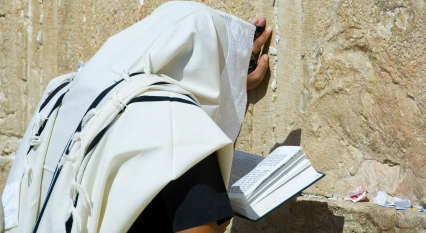 Torah-adherent Jewish parents take time to teach their children prayers, study the Torah and the Talmud, and speak blessings for their future. As a Bible believer, you can follow the same biblical examples and customs of our Jewish counterparts by making operational seven important life truths for your children.
Torah-adherent Jewish parents take time to teach their children prayers, study the Torah and the Talmud, and speak blessings for their future. As a Bible believer, you can follow the same biblical examples and customs of our Jewish counterparts by making operational seven important life truths for your children.
Parents know that there is an inbred tendency in all children to eventually rebel against instruction. There is a Hebrew word, yetzer, which means, “tendency or inclination.” Judaism teaches that man is created with two opposing tendencies: to do good (yetzer ha’tov), and to do evil (yetzer ha’ra). Each human is created with a free will to choose either good or evil.
Before the Flood, God said of mankind: “Every intent [yetzer] of the thoughts of his heart was only evil continually” (Gen. 6:5). The Talmud teaches that God gave the Torah to accompany man on his journey in life, that by studying God’s Word, man can control the yetzer and dissuade his evil inclination.
1. Teach Your Children
Children love learning by example, not just words. Scripture says, “Train up a child in the way he should go, and when he is old he will not depart from it” (Prov. 22:6). Many parents are not as concerned about the way their child should go, but more concerned about the way their child should not go!
Orthodox Jewish fathers living in Jerusalem relate various stories of sons from the Bible to teach their own sons how to act responsibly. For example, in Jerusalem’s Kidron Valley there are a series of ancient tombs carved out of the limestone rock. These hewn tombs, like stone towers, are a silent reminder of men who once had influence in the Holy City. One tomb is traditionally identified as the tomb of Absalom, the son of David. Absalom secretly revolted against his father and attempted to hijack the kingdom. His stubbornness and rebellion led to his demise and early death. (See 2 Sam. 18 and 19).
Orthodox Jews bring their sons to the tomb of Absalom, located near the edge of a Jewish cemetery, and recall the tragic story of Absalom’s rebellion against his father. Their purpose is to paint a vivid mental image of the dangers of disobedience and the high price a son pays when not following wise counsel.
A similar method was employed by a youth minister who took his entire youth group to a local cemetery and had them sit down on the grass. Near him was a tombstone with the name of a young man who had once served the Lord but had died in a sinful condition. He began telling about this young man’s life and revealed how his life was cut short by his rebellion.
He said the image painted by his message and the setting of the graveyard impressed the minds of the youth, and he noticed an immediate change in the attitude of the entire group for many months, especially after they discovered it was the grave of the youth leader’s own brother.
Visual learning helps stimulate recall. Our weekly telecast, Manna-fest, uses large props and graphics to form visual images of the message. Parents of young children often tell me, “My kids love your program. They love to see what props you use.”
2. Teach your children how to pray.
Christ’s disciples said, “Teach us to pray” (Luke 11:1). They knew Christ engaged in early morning prayer (Mark 1:35) and witnessed miracles resulting from His prayer life. The best way of teaching your children how to pray is to be an example and pray yourself!
As a child in the 1960s, I can recall my father praying in his upstairs church office with the windows opened. I just knew they could hear him across the river at the county jail. Many times in the evening I could hear Dad’s prayers filtering up through the air vents in my bedroom floor as he interceded in the basement of our house. When I was sick or in difficulty, I believed God would hear Dad’s prayers. His prayer life was an example and a pattern for me to understand how to pray. Let your children see and hear you pray at home and not just in church.
The simplest beginner prayers are praying at bedtime. In bedtime prayer, Orthodox Jews mention four archangels, two of whom are mentioned in the Bible (Michael and Gabriel) and two found in Apocryphal (nonbiblical) sources. They pray, “In the name of the Lord, the God of Israel: Michael on my right, Gabriel on my left, Uriel before me, Raphael behind me, and above my head the Shekinah [presence] of God.”
Raphael was traditionally an angel of healing, and Uriel was believed to be the guiding light of the Holy Scriptures. Children should learn a bedtime prayer as soon as they can speak.
See an error in this article?
To contact us or to submit an article





















